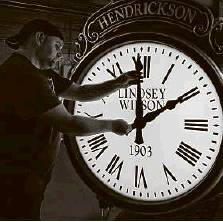We changed clocks this weekend; is it time for another change?
By Anthony R. Wood TRIBUNE NEWS SERVICE
PHILADELPHIA — Neither President Donald Trump nor his Democratic rival, Joe Biden, has addressed one of the divisive questions of our time — be it standard or daylight saving: Should we stop messing with our clocks?
For the record, some prominent sleep disorder specialists in the medical community have cast an emphatic “yes” vote, holding that the time tinkering messes with our bodies.
The clocks went back an hour at 2 a.m. Sunday.
So, one may ask, who would care about an hour here or there in one year? It is not trivial, argues Dr. Beth Malow, sleep specialist with the Vanderbilt University Medical Center neurology department.
The switching is a hostile act against the body’s circadian rhythms that regulate the sleep-wake cycle, she says. It’s not as though the Earth’s rotation speeds up when the clocks move up and slows down when they go back.
“From a circadian standpoint, you are out of sync for eight months,” she said Friday, adding she strongly favors year-round standard time.
Her arguments have strong support from the likes of Dr. Charles Czeisler, chief of the Division of Sleep and Circadian Disorders in the Departments of Medicine and Neurology at Brigham and Women’s Hospital; the three major sleep disorder professional organizations; and millions in Europe, where a movement has been building for years to scrap daylight saving time.
Czeisler and Malow contend that daylight saving time would be particularly bad for the health of those who live at the western edge of a time zone. If light is lingering until 9:30 p.m. on a June night on the eastern edge of a time zone, it’s going to stick around until close to 10:30 p.m. on the west side.
That, they say, is disruptive to sleep patterns, which could have a variety of health effects.
When the clocks go back, “people get frustrated because the sunsets are earlier,” Czeisler said. But the negative effects attributed to moving the clocks forward — increases in the incidence of heart attacks and traffic accidents — trend in the other direction.
Malow said the timing of the clock change this year is especially fortuitous because voters will be more alert on Election Day.
